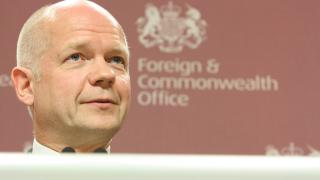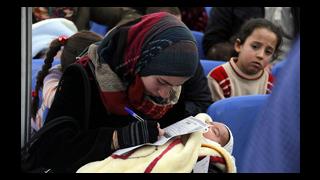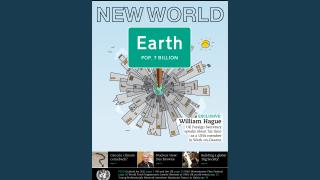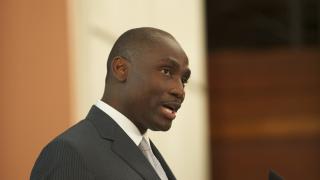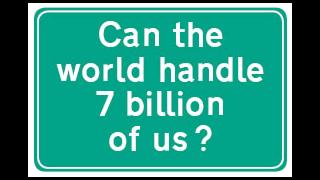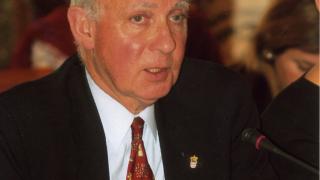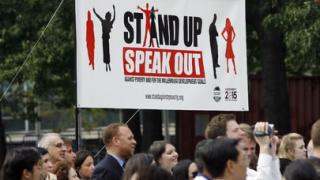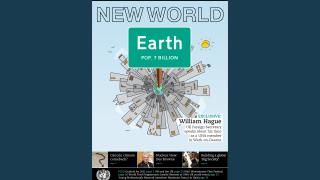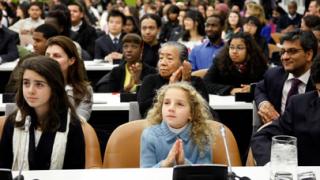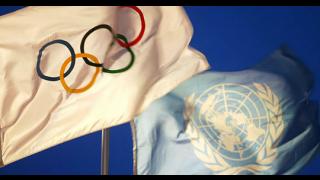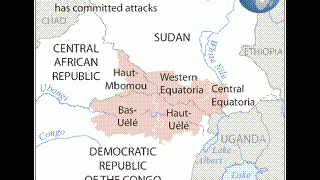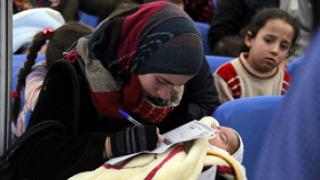
2011 is a significant year for refugee protection, marking the 60th anniversary of the 1951 Refugee Convention and the establishment of the UN Refugee Agency (UNHCR). The original purpose of the agency was to address the post-World War II refugee situation in Europe. But despite a mandate originally lasting only three years, UNHCR has no prospect of its work coming to an end.
Increasingly intractable conflicts are leading to the creation of seemingly permanent and global refugee crises. Population growth, urbanisation, climate change, water scarcity, and food and energy insecurity are combining in ways that displace people both inside and outside their countries. While many of these issues are recognised in the UN Millennium Development Goals (MDGs), little attention is paid to the relationship between conflict, displacement and development.
Violent conflict has the ability to throw off course the implementation of the MDGs, and most often it is the least of less-developed countries bordering conflict-affected states which shoulder the responsibility for hosting refugees. In 2009, developing countries hosted 80 per cent of the world's refugee population.
But refugees should not just be seen as a burden. Given access to education and livelihoods, refugees actively contribute to their host societies. Many of the UK's most prominent and successful figures come from refugee backgrounds, including Marks & Spencer founder Michael Marks, Sigmund Freud, singer Mika and the Archbishop of York.
And for those refugees who choose to return to countries which have been torn apart by conflict, poverty reduction and development are essential to achieving durable solutions and stability. In countries where displaced and formerly displaced people make up a substantial part of the population, strategic targeting of development aid can guide the transition from humanitarian relief to attaining the MDGs. Although none of the eight MDGs deals specifically with refugees, most, if not all, have direct relevance to their plight. Refugees, just like non-refugees, should benefit from poverty eradication, primary education, gender equality and the empowerment of women, and improved maternal health. The prevention of HIV/AIDS, malaria and other diseases, environmental sustainability and reduced child mortality should also serve to meet the protection needs of refugees.
Combating HIV and AIDS remains a particular policy priority for UNHCR. Around 1.8 million people living with HIV are affected by conflict, disaster or displacement. Approximately 87 percent of refugees have access to HIV treatment and 75 per cent of pregnant refugee women have access to prevention of mother-to-child HIV transmission programmes when available to surrounding host populations. UNHCR's role has recently been reinforced through its appointment as co-lead for HIV issues in emergency response together with the World Food Programme. However, more can be done to combat stigma and discrimination, and to ensure access to prevention and treatment services for people who have been displaced, as well as our staff and their family members.
The promotion of gender equality is another of UNHCR's central objectives. Situations of conflict frequently give rise to violence against women. Militarism aggravates and perpetuates violence, promoting a culture of fear and division that allows violence and aggression to flourish. The impact is disproportionately on women and girls, in particular through their subjection to rape as a weapon of war and other forms of violence.
Ten years ago, UNHCR spoke with more than 500 refugee women about their protection situation and as a result of this dialogue, UNHCR made its 'Five Commitments to Refugee Women'. Have we lived up to these commitments? By and large, yes. Individual registration and documentation for women refugees has increased. So too has women's participation in refugee committees and in the management of food and non-food items. Access to sanitary materials has improved, and almost all UNHCR offices have procedures for detecting and responding to sexual and gender-based violence. In the context of the 60th anniversary commemoration activities, UNHCR will be undertaking a new round of regional dialogues focusing on but not limited to women and girls. The first of these has already taken place in New Delhi, with more than 120 refugee women and girls and 70 refugee men from Afghanistan, Myanmar, Somalia and elsewhere participating.
While the MDGs do not specifically address the needs of refugees and internally displaced persons, refugees are a microcosm of the world's population. Clearly, many challenges remain, but the ten-year anniversary of the MDGs and the 60th anniversary of UNHCR should provide governments, the UN and the development community with a renewed commitment to ensuring that the needs of refugees - some of the world's most vulnerable people - are not forgotten.
Laura Padoan is External Relations Associate at the UN Refugee Agency London Office.

